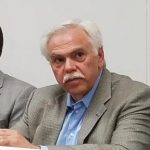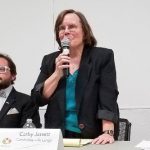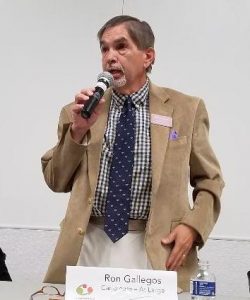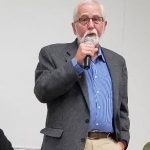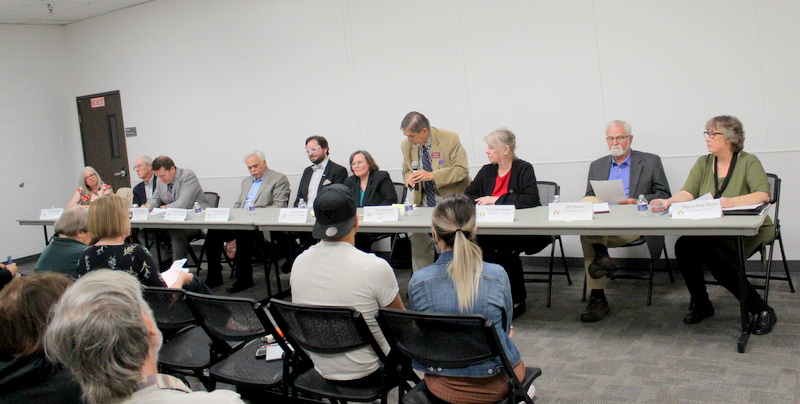
“With all due respect, I violently disagree with you,” candidate Ron Gallegos speaks to fellow candidate Cathy Jarrett about information she was promoting about the rate of violence by immigrants compared to the general population. Jarrett is running on a platform in nonsupport of the LGBTQ community, nor of those in the country without documents. (all photos: The Nation Report)
Working for the Latino and LGBTQ vote were all candidates who hope to represent Longmont after the November election. Mayoral candidates Brian Bagley, Roger Lange, and Sarah Levison appeared with at-large city council candidates. Four candidates are competing for two at-large positions. Polly Christensen is defending her seat as her term ends in November. Ronald Gallegos, Cathy Jarrett, Aren Rodriguez, and Alex Sammoury also hope to win an at-large seat. Candidates for Ward 2, Marcia Martin and Jeff Moore also aired their platforms.
The forum, held at Front Range Community College was hosted by the Colorado Immigrant Rights Coalition, the Latino Task Force of Boulder County, the League of Women Voters of Boulder County, and Out Boulder County.
All candidates agreed that there should be a human rights division that would be responsible for advising council on issues of immigration, homelessness and LGBTQ issues.
But the unanimity ended there.
When asked about the US Supreme Court case Masterpiece Cakeshop v. Colorado Civil Rights Commission, Jarrett was the lone candidate who thought that cake baker Jack Phillips had a right to refuse to bake a wedding cake for same-sex couple Charlie Craig and David Mullins in 2012. Earlier this month, the Department of Justice sided with Phillips who said that his religious beliefs prevent him from filling the couple’s request. The case is pending.
As her argument, Jarrett referenced a 2015 case where the Colorado Civil Rights Division ruled that Azucar Bakery did not discriminate against customer Bill Jack who ordered two cakes in the shape of bibles on which he requested anti-gay bible verses. Jarrett said that she felt that a double-standard was in effect, “Why was one person told he could not refuse to make a cake, and somebody else by the same Supreme Court of Colorado, was told that they can refuse him service.” But the audience was quick to provide the argument that the Jack case involved hateful messages, while the Craig-Mullins wedding celebration cake would contain no messaging.
Gallegos disagreed with Jarrett, “Here’s my feeling. If you decide to enter into the public arena, like being in business, you have to serve everybody. If you decide you want to have religious convictions, or religious beliefs, leave that at the religious altar.”
Christensen agreed, “This is a very, very, wrong idea that a corporation has a religion. Corporations don’t have religion. They are not persons. They’re not humans. We can’t allow them to continue to claim that they have a right to discriminate based on corporate religion.”
Moore added, “What I believe is that religions teach love and compassion. When two people come to you in love, you’re going against your religion to deny that service.”
Martin spoke next, “[This] was settled by black people in the south who wanted to eat lunch at a lunch counter in a five and dime store, and they were refused service. And it was settled that they could not be refused service. And it was a landmark in the case that made us into a just society, or a more just society. I think [this] is an insidious attempt to invert the idea of freedom of religion, to make it the freedom to impose your religion on someone else, which is exactly what our founding fathers left Europe to get away from.”
Levison also disagreed with Jarrett, “If you’re opening your business, you’re opening your doors to serve everyone. And because your religion says one thing, does it mean that you have a right to discriminate based on what your religious beliefs are? It’s re instituting that fear and hate. And I just think it’s totally wrong. And I think when we find out about these things, and these kind of businesses that deny service to serve LGBTQ people, maybe they won’t serve somebody that has a head scarf, maybe they won’t someone who walks in who’s Jewish, and they can see the Tzitzit shawl, prayer shawl underneath, their garment. Where does it end?
Lange: Anytime I do business with somebody, I want to be treated fairly regardless of what they think of me. They’re in business to do business with people. They’re not in business to be selectively doing business with people.
Bagley: you cannot discriminate based on a person’s gender, not on their religion, race, ethnicity, nationality, disability, or their sexual preference. Period. Full stop. And so if someone has an inherent trait, that is the way they are, then we should not discriminate.
Sammoury: I think we all have rights in the United States, and who’s to say somebody’s right is more important than another’s. And until the case is decided, we just have to wait and see, I guess. I think everybody should have equal rights, I’m not questioning that at all.
Rodriguez: As far as that specific case is concerned, I think that too often in our political environment, that religious liberty is being used as a way to explain away hate and xenophobia. As such we need to recognize when it is truly hate or xenophobia versus a business’s right not to serve someone. If you are being belligerent in a business, you should be removed from a business.
Question: Immigration impacts many Longmont residents. Recently city council has been asked for its stance on Sanctuary Cities. Do you believe city officials and police should use their resources to help and collaborate with ICE?
Sammoury: I think its clear, although we’re not called a Sanctuary City, we do protect everybody’s rights.
Rodriguez: In essence, Longmont is a sanctuary city. So I think it’s great that [Police Chief] Mike Butler came out and said, “No. We ensure the safety of everybody. That includes whether you’re documented or undocumented residents of our city.” And that’s amazing because that’s really what helps this city be a safe place.
Jarrett: I support a city that applies the laws equally to everybody, not giving special rights to some, that aren’t given to others. I know that there have been some instances where people who were here illegally, and they committed a crime, and then were released from jail, and then immediately committed another crime. The man in Denver who in this past year murdered an innocent man at a bus stop.
So I think we need to apply the laws equally to everyone and not have special rights for some who are here illegally because the police don’t want them to be deported.
And also I understand that the crime rate for people who are here illegally is higher than that for our regular population, and I think that we need to have a just system here.
Gallegos: (directed toward Jarrett) With all due respect, I violently disagree with you. (applause)
Statistics will bear out, more white people kill Latinos than Latinos kill white people. More white people kill gays and lesbians and transgender people than the opposite.
This is the oldest trick in the book, to blame the victim. To cast doubt. To darken the picture. To say we’re the criminals because we’re different. We speak a different language. We have a different religion. It’s the same old basic playbook. It’s hate. It’s intolerance. And we shouldn’t put up with it any longer.
Christensen: Everybody in town needs to feel free to call the police if they’re in trouble. Well they’re not going to call the police if you’re afraid of the police. During the flood there was a guy who was living down in the trailer park, and the police went down there to make sure that everybody was out. Well he was terrified. He wouldn’t come out. Because he was afraid he was going to get deported because he was undocumented. He could have died. We cant live in a town where people are afraid of their fellow citizens and where people are afraid of the police. So no, we cant do that.
Moore: Being undocumented is not criminal. It’s an administrative process through the immigration services that the federal government operates that is outside the scope for the city of Longmont. I don’t want our community to be known as a community that goes in and kicks down doors and drags people out in the street. That’s kind of the view that a lot of people have with ICE and I think that’s totally inconsistent with federal law and constitution. So I would hope that we could continue down this path of keeping all of our Longmont residents safe, even if they’re not a citizen.
Martin: There was an error of fact made by Ms. Jarrett. Actually the crime rate who have committed the civil violation of overstaying their visas is considerably lower than it is for American citizens, and Americans with green card. Because those people have nothing to fear except the consequences of the crime itself. They don’t have to fear losing their home.
Levison: So Longmont does not have a proud history sometimes. We all know. There were four years in the 20’s when every member in the city council was a member of the Ku Klux Klan. There were signs on Main Street that said “no dogs or Mexicans.” I don’t need the city needs to help ICE with any city resources whatsoever. And we can withstand what they will do to us if they do. I think that our police chief is really intent on making sure that everybody is welcome in Longmont and our little slogan, “You belong in Longmont” is going to stand with people in this room.
Lange: Let me start with the Sanctuary City issue. And as somebody pointed out before me, it got to be a very hot debated issue in not only our towns, but other towns. Are we, or are we not? And the debate went on and on and on. Until our police chief decided to stand up and put it to bed. And basically he said, “I don’t care what we’re called, it’s how we behave.” And it’s as simple as that. And that was the end of the big Sanctuary City debate.
Bagley: So as mayor, I promise that we will never, ever, cooperate with the authorities and ICE should they come to Longmont. Only under one condition would we ever cooperate. That is if a law enforcement agent comes with a constitutionally executed and valid warrant. And in order to that, you need to have a specific individual, for a specific reason, with specific details, of a specific crime, in a certain location. And it has to be signed by a judge saying that there was probable cause.
And as it’s been pointed out, if you’re here without documents, it’s an administrative process that we have no jurisdiction over as a city. And quite frankly, it’s none of our damn business. And so that is my stance on this. I support DACA. I support the DREAM Act of 2001. And there was one in June of 2017, essentially the same bill. I support those too.
Question: The Longmont Latino Caucus recently passed a resolution in support of DACA recipients. Do you support a clean DREAM Act with a pathway to citizenship and do you think the city should pass a resolution in support of the DREAM Act?
Rodriguez: I support a very, very clean Dream Act. I do not want to see anything tied to the Dream Act that does not directly involve the Dreamers. Anything that has to do with a border wall for instance and other immigration reforms is proposed as some sort of deal with the folks who are putting forward a clean DREAM Act just will not fly with me.
Jarrett: Well looks like I’m a radical again. I’m not sure of all of the parts of the DREAM Act. I think that people should come here legally whether they are from China, or Sweden, or India, or Australia, or anywhere else on this globe. I think there are millions of people who would love to come here but they can’t come over here as easily as some others. So I really feel that you should come over here legally to become a citizen.
Can I go to another country and demand to be made a citizen? From what I understand, if you come from El Salvador to Mexico illegally, you’re likely to be killed, and if not killed, sent back to El Salvador. I think we need to not kill people, but I don’t think we need to make citizenship available.
Gallegos: (directed toward Jarrett) I actually like you, but I’m going to disagree with you again. My family arrived in about 1540. We were the Jews escaping the little party they had for us called an Inquisition in Spain. So this area, and I’m talking about Colorado almost all the way up to Montana was Hispanic. So to create by Executive Fiat or even by congressional action, some administrative lines that are really arbitrary is not going to erase two or three or 400 years of people present here.
I just want to correct history, because history’s a funny thing. The guy that wins, usually does the writing.
We’ve gotta get citizenship for those folks but we still have 15-20 million people sitting out there in a very tenacious setting, and we really need to deal with the issue of citizenship for those people too because they’re not going away. We don’t have enough school buses to load them all up.
Christensen: All these young people signed up [for DACA] in good faith, gave all their information, and now they’re being completely betrayed. This is an appalling thing to happen for our country. It’s a betrayal of everybody who ever came here which is everybody except the Native Americans.
We need some permanent security so these people, these young people who are working hard can build a life and not have it constantly go one way or the other.
[Senator] Cory Gardner actually did sign onto this, amazingly. And so did Mr. Bennett, but we also want to just encourage them that we’ve got their back, and we support them.
Moore: We’re only in this situation because Congress has not completed a coherent immigration policy since before Reagan, even. I believe that there are those in this country that deserve a path to citizenship. They live here, they’ve lived here. They’ve raised their families. They own businesses. They have jobs. They support our agriculture. They support all of our industrial operations. They deserve better. And it’s time for us as a nation to come up with a coherent, fair, immigration policy that does lead to a path to citizenship.
So we need to deal with it, the DACA kids. That’s just totally wrong what our current president did, to yank the rug out from underneath them and make them very vulnerable to be removed from our country, because if we have all their information. They volunteered that information. And I have said it before, but these individuals are extremely brave to be able to live here, and work here and be treated like they are right now.
Martin: There’s an irony going on here which is, that the fear of the other is coming from feeling like you have to have your country separate from everybody else and defend it because you’re afraid. And to think you are the native, and the others are the others, are the foreigners, are the barbarians. They used to be the same word.
It’s really ironic that that’s the way we think of ourselves. To the extent that we turn the fact around and say ya those others are criminals, when in fact, they’re less criminal. You know that’s just a shame because we cant put ourselves at the center.
Levison: I believe that the federal government has to do something about the DREAM Act. It’s been sitting on the books forever. What can we do about it? First of all a great city council can stand up and say, we support a clean DREAM Act. These are our fellow neighbors and Longmonters that have been here since they were 6 months old. They’ve lived a lifetime here. When you’ve invested that much time, you belong to that country.
And one of the things council can do, and Jeff [Moore] and I, and I think Roger [Lange] was involved in National League of Cities which is a national, municipal organization. We advocate there for changes of the policy in the federal government. And we have a strong voice.
Lange: Well the answer to the question very simply is, I believe that the DREAM Act should be enforced, and that these people should be protected strings or no strings.
We’re not going to send these people back. Where would you send them to? This is their home. You can t send them back to anywhere. Because they belong here. The other thing I think doesn’t get talked about very much is these people are a very big fabric and an important part of our economy, our business. They’re working into our society. We cant afford to let these people leave. They’re very important to us.
Bagley: To break a law you have to have mens rea whether it’s a criminal statute, a civil statute or whatever, in order to violate a statute, you have to know what you are doing. Children can’t. And so the thought that someone who comes in at the age of 6 weeks, and then somehow because they are undocumented and not a US citizen, is somehow expected to return to some unknown country of origin.
I would love to try an experiment. If your family, and you have undocumented children, come to me. I will find you a US citizen home,and we will play legal shenanigans to adopt that child. And they will get their papers. They will become US citizens and we’ll just shift back. I’m surprised that nobody has just used that legal loophole. Let’s do it. In Boulder County, we can get the whole dang lot just made US citizens. And Boulder county judges, come see me. We’ll adopt them all.
